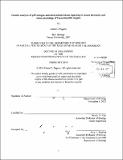Genetic analysis of p38 mitogen-activated protein kinase signaling in innate immunity and stress physiology of Caenorhabditis elegans
Author(s)
Pagano, Daniel J. (Daniel Joseph)
DownloadFull printable version (9.815Mb)
Other Contributors
Massachusetts Institute of Technology. Department of Biology.
Advisor
Dennis H. Kim.
Terms of use
Metadata
Show full item recordAbstract
Host-microbe interactions play an important role in the physiology and evolution of animals. Interactions with microbes can generally be considered beneficial or pathogenic to the host. The ability of an organism to mount an immune response to infection by pathogenic microbes is critical to its survival, and basic mechanisms of innate immunity are conserved in evolutionarily diverse species. A pivotal signaling pathway in the evolutionarily conserved innate immune responses of multicellular organisms is the stress-activated p38 mitogen-activated protein kinase (MAPK) pathway. This thesis focuses on the physiological role of p38 MAPK signaling in the host defense of Caenorhabditis elegans. In Chapter Two, I report the identification and characterization of the conserved ATF/CREB bZIP protein ATF-7 as the key transcriptional regulator of the PMK- 1 p38 MAPK-dependent immune response to pathogens. These data suggest a model in which the PMK- 1 p3 8 MAPK phosphorylates ATF-7 and switches it from a transcriptional repressor to a transcriptional activator of effector genes of the innate immune response of C. elegans. In Chapter Three, I characterize the roles of PMK- 1 and a second p38 MAPK ortholog, PMK-2, which are encoded in an operon, in tissue-specific signaling mechanisms involved in host defense. I show that PMK-2 functions redundantly with PMK- 1 in the nervous system to mediate neurobehavioral responses to pathogens. Furthermore, I demonstrate a role for the miR-58/80-82 family of microRNAs in regulating the tissue expression of pmk-2, which suggests a role for microRNAs in the establishment of tissue-specific expression of co-operonic genes. The work described in this thesis establishes the ancient evolutionary origins of the p38 MAPKCREB/ ATF pathway in innate immunity, and establishes a role for microRNAs in defining the tissue-expression pattern of co-operonic p38 MAPK genes. New directions for further understanding the ancient evolutionary mechanisms of p38 MAPK signaling and their tissue-specific regulation are discussed in Chapter Four.
Description
Thesis: Ph. D., Massachusetts Institute of Technology, Department of Biology, 2014. Cataloged from PDF version of thesis. Includes bibliographical references.
Date issued
2014Department
Massachusetts Institute of Technology. Department of BiologyPublisher
Massachusetts Institute of Technology
Keywords
Biology.